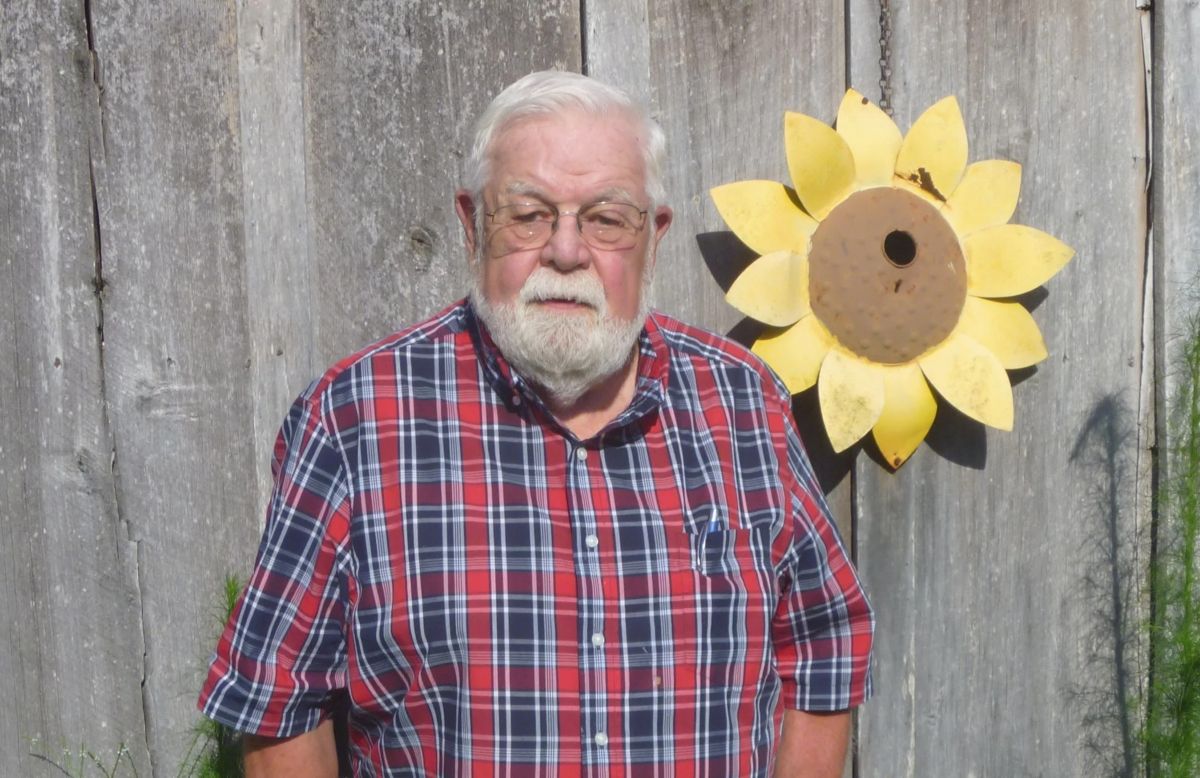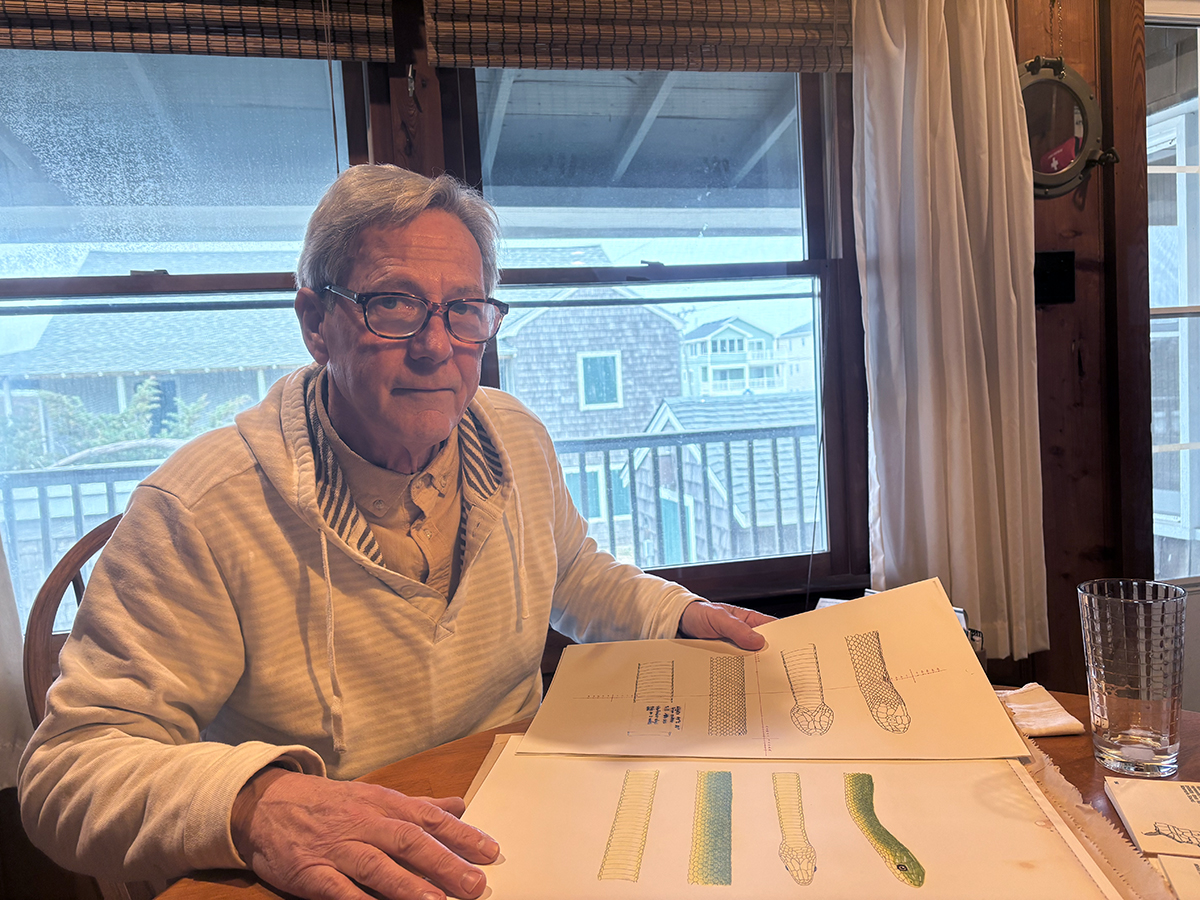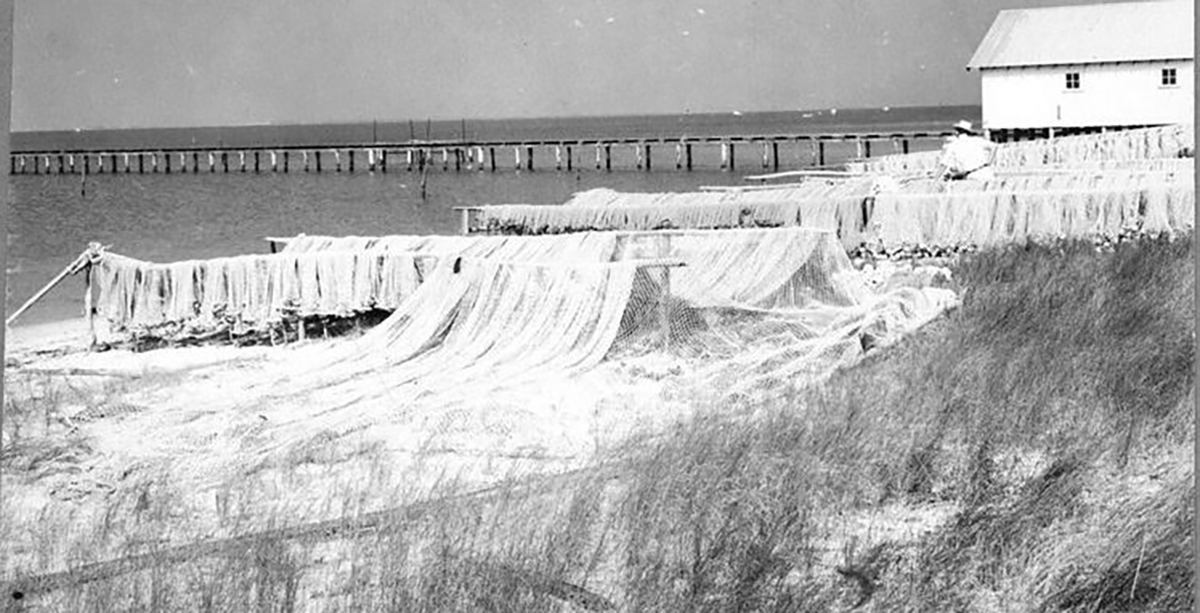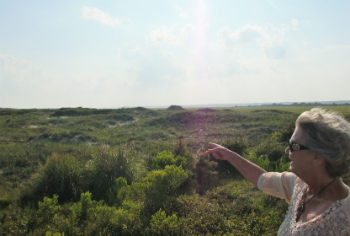 Sue Weddle points to Bird Island, the coastal reserve she helped fight to protect over 20 years ago. She’s been keeping an eye on the coastal environment of Sunset Beach ever since. Photo: Daniel Patterson |
SUNSET BEACH — Sue Weddle gingerly climbs her neighbor’s high dune, as the afternoon wind whips soft, silver curls around her face. She surveys the vast area between Sunset Beach’s westernmost beach access and Bird Island, the N.C. Coastal Reserve she fought to protect over 20 years ago. Moments later she scurries back down.
“Isn’t that incredible?” she asks.
Supporter Spotlight
Incredible, indeed, when you consider that this stretch of oceanfront is the last large undeveloped area on this ancient barrier island – and if and when land next to it is developed, the petite grandmother of three will be watching very, very closely.
Sue Weddle is no stranger to the preservation of coastal land. The 2014 recipient of a N. C. Coastal Federation Pelican Award has worked diligently for the past two and a half decades to ensure that her beloved Sunset Beach retains some of its natural character. She was a founding member of the Bird Island Preservation Society, a group that accomplished what is considered one of the great conservation victories in N.C. history – the state purchase of 1,500 acres of barrier island, wetlands and estuaries.
“We started working for Bird Island in 1992, when Bill Ducker led the effort,” Weddle notes.
For 10 years the group coordinated with state and federal agencies and private property owners from Sunset Beach to arrange the purchase of the large natural tract. The accomplishment is heralded at an educational kiosk that was dedicated in 2013.
“When it was over, we won the Governor’s Award for Conservation Group of the Year in 2002,” the St. Louis native adds softly with a smile. “But we realize now, the work is far from over.”
Supporter Spotlight
The enchanting environmentalist and her husband, Owen, moved to North Carolina in 1985 when he accepted a job at N.C. State University.
 Sue Weddle won a Pelican Award for being a dedicated, persistent and effective advocate for our coast. Photo: Daniel Patterson |
“We had just left the lousy Houston housing market and decided to wait on purchasing a home,” Weddle says.
While in Raleigh, the couple rented in the historic Oakwood district. A few years later the Weddles decided to take a chance and bought a marsh-front lot on the west end of Sunset Beach. When Owen Weddle took a job at Brunswick Community College, the couple moved to their beach house.
The house, lovingly christened “The Odyssey,” was completed in 1989. That first spring, after a hard rain, Weddle sat on her back porch and saw a large sediment plume flowing her way. “It seemed to have a sheen of oil on top. It was then that I became an environmental activist,” she says with a big smile.
The humble Weddle sails under the radar as a typical activist. She is thoughtful, reserved and extremely cautious. She fully recognizes the rights of property owners to develop their land; however, it is behind the scenes that she works her magic helping to ensure that regulations are followed. She is always on the ready, educating herself about new rulings, following developments in the state legislature and working the phone and emails.
The refined and soft spoken senior has compiled a much-coveted email list of over 800 property owners, which she uses to keep them informed about new issues on their island. For the past few months, she has had to use the list more than she would like. The inlet that once separated Bird Island and Sunset Beach has closed. This year, the N.C. Coastal Resources Commission removed the inlet hazard designation for old Mad Inlet, thus loosening developmental rules for the area. According to Weddle, “The developers have waited for the sewer and waited for the bridge and now all heck is breaking loose.”
The undeveloped area is a vital component of the ecosystem because the high dunes protect the important marshes and estuaries, she said, and with the inlet gone, the land is now connected to the sensitive Bird Island reserve. Now that the regulations have loosened up, the developer plans to build a 500-foot-long bridge from the end of Sunset Beach over the marsh to the property. They intend to build a private resort along the oceanfront.
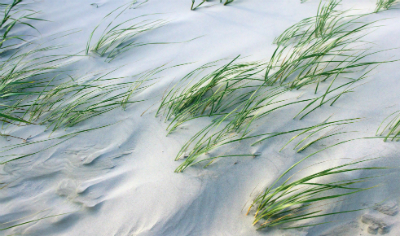 “The ambiance of Bird Island retains the character of what the North Carolina coast looked like before one European stepped foot here,” Sue Weddle says. “Any development of the area will certainly have an impact on the environment.” Photo: Daniel Patterson |
“The ambiance of Bird Island retains the character of what the North Carolina coast looked like before one European stepped foot here,” Weddle says. “Any development of the area will certainly have an impact on the environment.”
For now, Weddle is on the watch, contacting federal and state agencies to determine the best course of action. She knows the rules and plans to ensure that the developer knows them as well. “I am going to watch and make sure that every ‘t’ is crossed and every ‘i’ is dotted,” she grins.
As Weddle and her husband sit on the back porch of the Odyssey, a spectacular sunset splashes amber and coral hues across the marsh. She reflects on the olive tree she and Owen planted in her front yard. They planted it from a single seed.
“Everyone said it wouldn’t grow here,” she says. Not only has the olive tree survived, it has thrived, and for the first time ever, it is bearing fruit.
“When we planted our oak trees, our neighbors laughed at us saying we would not be alive to enjoy them. ‘That’s OK,’ we told them. ‘We don’t plant for ourselves, we plant for the ages.’”



